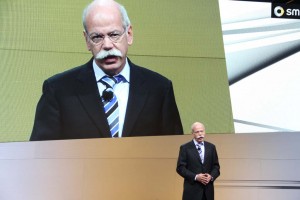Daimler AG is doubling down on electric propulsion – and backing its expanding investment in battery technology with the launch of a new charging system that can recharge the batteries for an electric Smart car in as little as one hour, Daimler chief executive officer Dieter Zetsche told the company’s shareholders as he addressed the company annual meeting.
The maker is looking at opportunities to grow electric car sales in not only key Western markets, but also in emerging markets such as China, where Zetsche told investors the technology has become “a big issue.” With worldwide car sales likely to increase by 50% before decade’s end, he stressed, automakers like Daimler have no alternative to turn to battery power.
In the days leading up to the annual meeting, Daimler locked down a new joint venture with Chinese partner BYD – generally considered the leader in that market’s battery car technology – to launch the all-new Denza brand. It will focus on launching a line of affordable electric vehicles.
“The greater the total number of vehicles in the world, the harder we must strive to reduce fuel consumption and emissions of each individual automobile,” Zetsche said, adding that, “We aim to further enhance our leadership in the field of green technology.”
Nonetheless, he acknowledged there remains significant customer resistance to battery technology:
- “Excessively high cost” for the technology;
- “excessive charging times,” and
- Inadequate charging infrastructure.
Daimler is hoping the address all three.
“Convenient charging times will become reality thanks to our fast charging stations, which can be installed in driver’s homes. These fast charging stations will cut charging time from 8 hours to less than
one,” Zetsche said.
Onboard GPS systems used on the electric version of the Smart car can guide the driver to a public charging station when the battery begins to run down.
Zetsche said Mercedes-Benz is looking at additional hybrids, including the S500 Plug-in Hybrid, the first ‘’three-liter car” in the premium segment.
In 2012 and 2013 alone, the Group will invest $15 billion in research and development and $15 billion in property, plant and equipment. A growing chunk is going into sustainable vehicle technology, and Daimler is aiming to leverage its investment through an expanding alliance with the Euro-Asian Renault-Nissan Alliance.
By 2020, the annual global vehicle market should grow from about 80 million vehicles to about 120 million units, forecast the Daimler CEO.
“The question is not whether this growth will take place, but how it can be made sustainable,” said Zetsche. He believes that innovation has the potential to convert growth into prosperity. “Where that occurs, growth will be ecologically compatible and productive for both society and the economy,” explained Zetsche.

